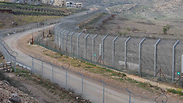
High alert on Syrian border: 'Next attack is only a matter of time'
Golan Heights attack that injured four Israeli soldiers did not surprise the IDF, who continue to stay on high alert in the area and intensify operational procedures.
The attack against IDF troops near the Syrian border on Tuesday is another stage in the general escalation in the tense relations between Israel and Hezbollah, the organization which may be responsible for planting an explosive that injured four Israeli soldiers, one of whom is in serious condition.
Last December, an explosion occurred near the Syrian border, and since then, the assumption within the IDF became that another explosive aimed at troops is only a matter of time. From that time, according to foreign reports, the IDF managed to attack a weapons convoy in the vicinity of the Lebanese-Syrian border.
Related stories:
- Four IDF soldiers hurt in blast on Israel-Syria border
- Explosive device targets IDF force on Lebanon border
- Hezbollah's thirst for revenge will not end
During the past weekend, Hezbollah attempted to carry out an attack in Har Dov, but there were no reports of casualties among IDF soldiers. Even after the violent event on Tuesday, the assumption still remains that the last explosive device in the area has yet to be seen.
Following the incident, the Northern Command is expected to intensify its operation procedures along the Syrian border. Army officials estimate that another attempt to harm IDF forces in the vicinity of the border will be carried out and the level of alert in the region will remain high due to fear of escalation.
While the army still does not know who stands behind the Tuesday attack, it is speculated that the culprit is Hezbollah, the terror organization that has become Syrian President Bashar Assad's ally. The assumption remains held since the region in which the attack occurred is under Syrian army control, unlike most of the border fence with Israel, and since the organization is seen as responsible for the last two explosives that were placed in the area.
It may also be that the explosive device was placed by jihad forces trying to pull the IDF into fighting against the Syrian army, which still controls the northern part of the Syria-Israel border.
Immediately after the incident, the army conveyed "harsh statements" to the Syrian regime through the UN force operating in the area, UNDOF. "The IDF reserves the right to operate in whatever way and time it sees fit in order to protect the citizens of Israel," a statement on behalf of the army read.
Army officers estimate that those who placed the explosive device chose the area of operation very carefully, while taking advantage of the fact that it is difficult to observe the region due to its mountainous terrain.
The force that was attacked Tuesday did not cross the border fence while the explosive device detonated. The IDF will examine whether it would be appropriate in the future to allow soldiers to leave their armored vehicles, in similar cases in which a force identifies suspects on the other side of the border.
In recent months, the establishment of a new combat-reconnaissance battalion was completed in the Golan Heights, which should provide a solution to the problematic area in which the explosive was placed, through advanced observation systems and radars that were deployed in the region. These systems have already proven successful in recent weeks with an early detection of the cell that placed an explosive in central Golan. On Tuesday, it seems, the army did not get an advanced warning.
Like Gaza like Golan
The new Golan Heights Division has recently formulated an operational outlook that is similar in the level of threats and coping with them as the Gaza Division.
Al-Arabiya reported that the aim of the attack was to kidnap an Israeli soldier. The device used Tuesday contained thousands of fragments and cells, and in order to rule out a kidnapping attempt, IDF cannons immediately fired heavily to mask the area. Within minutes, tanks shelled towards Syrian outposts, and Tamuz missiles hit more distant positions.
The incident saw four soldiers injured, one of them is in serious condition. He was operated Tuesday evening in Rambam Medical Center in Haifa. Another soldier is hospitalized in moderate condition and two other were injured lightly in the attack. All four soldiers sustained injuries as a result of shrapnel.










